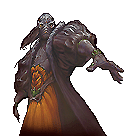 |
 |
 |
 |
 |
 |
 |
 |
 |
 |
 |
 |
![]()
 |
 01-24-2005, 02:54 PM
01-24-2005, 02:54 PM
|
#121 | ||||
|
Jack Burton
Join Date: May 15, 2001
Location: The Netherlands
Age: 41
Posts: 5,888
|
Quote:
The problem is, though, that most games (or worlds, for that matter) don't elaborate on situations. Once it's done, it's done. You seldomly get a chance to explain your actions and try to set things right if you're a good character. While that isn't necessary, you're at least obliged to your character to make the situation understandable. Not only to yourself but also the inhabitants of the fantasy world you character dwells in. Quote:
That's what's tricky about alignments. While it is a good system to keep classes in check if you're actually playing a class based RPG, it proposes problems when it comes to moral issues like the ones we're discussing here. The only valid solution, in which penalizing characters is done correctly, is by using beforehand knowledge (as you yourself have said as well, Cerek) to place the judgement upon. A DM should know what the motives of your characters are, should know if the motives are valid for that specific alignment, and should know what the consequences of that specific action should be. The problem is causality really. What are the results of the actions on the longer term? No one [but the DM] can predict such a thing, but penalizing someone for his actions right away might seem unfair at that point, but understandable later on in the game and vice versa. This, basically, is the reason why I have problems with games that support reputation systems (even KotOR which has a very 'fluid' form of a reputation system IMHO) but I can't come up with a better system just yet. Quote:
Quote:
I had a similar incident happen to one of MY characters in a game. I was playing a thief and had joined with a group of travelers I didn't know that well (but they had traveled together for a long time so they knew each other very well). Early in the campaign, the DM decided to mess with my character. This unusual character showed up to confront the group and was immediately attacked by one of the members (even though the character had not made any hostile actions yet). The character pretended to be an innocent victim and said "You attack me when I don't even have a weapon?" The party member insisted on continuing with the attack, so my thief decided to let the newcomer use his short sword. When the battle was over, the character returned my sword and had somehow bestowed an enchantment on it, making it a +2 sword. Well, my character was happy with that. What I did NOT know was that this was an "age old" nemesis of this particular group and he had done a LOT of stuff to these adventurers in the past. So they did not look favorably on my actions. Still, all that was well and good until a couple of sessions later. In that game, another party member kept making rude comments and implied threats to my thief over his earlier actions. I was getting pretty fed up with it, but kept letting it slide. Then the DM took the player into another room. When they came back, the player pointed straight at me and said "YOU are in BIG TROUBLE!" The next thing I knew, my thief came under attack from several party members. The DM had taken the player aside and had actually told him a bald-faced lie about what my character had done with their nemesis. This was NOT "in game" info. This was the DM telling the player a flat out lie in order to make him attack my character. The next day, I went to the DM at his work and I gave him an earful. I told him I was NOT going to let him screw over one of my characters just so HE could get a chuckle out of it and I told him I was removing my character from his game immediately. I also told him if he pulled any more crap like that, I would quit gaming under him completely. He agreed he had been out of line and allowed me to bring in a different character. When the campaign was finally over, one of the other players said "See, man, you shouldn't have had your thief leave the party. Now he's trapped in this gameworld forever." I said "No he isn't. I took him out of the gameworld the day after the DM screwed him over". All the other players got really hacked off, but I told them I was NOT going to let ANY DM screw over a character just for the fun of it. Had I done something deliberately to screw the party, then yeah, I would have just had to take my lumps. But when the DM actually altered the game so that the party attacked my character...nope, sorry - ain't gonna happen. [img]graemlins/nono.gif[/img] [/QUOTE]While inconvenient, it's not something that's faulty about the system, n'est-ce pas? It's causality as well alright (I think I'm starting to sound like the Matrix here... [img]graemlins/matrix.gif[/img] ), but with a pinch of human subjectivity added to it. Real-life causality, if I may call it that way. The consequences of someone disliking you, your character, both, or just blatantly because he felt like doing it. EDIT: I did so many Preview Posts my eyes still twitch from checking the quotes and the HTML code. And still I didn't get it absolutely right [img]graemlins/crying.gif[/img] [ 01-24-2005, 02:57 PM: Message edited by: Link ]
__________________
Rowing is not a sport, it's a way of life Goal: Beijing 2008 |
||||

|

|
 01-24-2005, 04:28 PM
01-24-2005, 04:28 PM
|
#122 | |
|
Registered Member
Iron Throne Cult
 Join Date: August 27, 2004
Location: North Carolina
Age: 62
Posts: 4,888
|
Quote:
There are situations where you just have to make your best guess, but in that case, the character should still base his action on his chosen alignment. Here is an example from the very first game I ever played. I was playing a CG Ranger and we were sitting in a bar. A drunk stumbled into my character and spilled his drink on me, then he got belligerent and said some crude remarks. I had no idea what to do so I asked my buddies. All of them were learning the game too, but one had supposedly played before. He told me I should punch the drunk - so I did, and managed to knock him out. Then he said "Search him and see if he has any gold". OK, I did and took the money I found. The DM was very lenient since this was my very first game. He said "OK, you take his money....and you notice that everybody in the bar is staring at you because they're not used to seeing this type of behavior from a ranger." Now that I'm more experienced, I would never have a ranger punch out a commoner just for being rude and I would never attack him at all unless he drew a weapon and attacked me first. On the other hand, I also played a CN Barbarian in several games. HE would have NO problem with knocking the drunk out on general principle. The player is supposed to determine the personality and motivations of his character when he creates them. Then he chooses an alignment appropriate for that class and personality. During the game, his actions need to follow that chosen alignment, or the DM may penalize him. In some cases, the character may just have to do some kind of penance. In other situatons, they may be forced to accept a permanent change of alignment that more closely matches the actions they took. This is also the principle the Virtue Mod operates on. It looks at the characters chosen alignment, then compares it to their in-game actions. Then it decides if those actions "fit" the alignment, or if the character is violating their chosen alignment. If the latter is the case, then the Virtue Mod adjusts their alignment according to the actions they have taken. I decided not to respond to the rest of your post because it was getting to be very long.  I also agreed with most of what you said in the rest of your statements, so I didn't see any need to add an extra perspective to them. I also agreed with most of what you said in the rest of your statements, so I didn't see any need to add an extra perspective to them.
__________________
Cerek the Calmth |
|

|

|
 01-24-2005, 05:23 PM
01-24-2005, 05:23 PM
|
#123 | |
|
Ironworks Moderator
 Join Date: June 27, 2001
Location: Montreal, Quebec, Canada
Age: 44
Posts: 6,766
|
Quote:
That's an horrible system. It first started as a simple good, neutral and evil. In the next edition they added the lawfull, neutral and chaotic axis to try to make something less stupid with it. It's not a deep system, just a dumb way to label characters. Most D&D players I've seen just tell themselves "My character is good so he must help people, he's lawfull so he follow laws." Wow! What a complex character! Just look at spells like detect evil/good, protection from, and smite... Just because someone is selfish, he represent evil? Someone that help his neighboor represent good? And here I thougt only angels/deamons were made of that stuff... What about the misguided guy that kill criminal in the name of Tyr, is he evil? He believe his cause to be righteous... Who decide what is evil and is not? Is it because he's killing people? Adventurers do that all the time... You can't describe someone with 2 words... No one is "good" or "evil"... [ 01-24-2005, 05:27 PM: Message edited by: Luvian ]
__________________
Once upon a time in Canada... |
|

|

|
 01-24-2005, 06:02 PM
01-24-2005, 06:02 PM
|
#124 | |
|
Emerald Dragon
 Join Date: December 10, 2003
Location: UK
Age: 41
Posts: 961
|
Quote:
Everyone is "good" and/or "evil" Alignments have become the bane of roleplaying, due to people taking them as rules for actions, or taking them to mean more than they do.. I like to take alignments as how somone is generaly motivated, or how they see the events in the world.. Alignments are intended to help decide what somone who's personality might be radicaly diffrent from your own would do when faced with a situation, but is should never force actions. -=][=- Cerek, my D&D P'np experience in years, zero.. But that means about this much *puts fingers so there's no gap between them* Asking how long somone's played a system is like pointing to a post count.. -=][=-
__________________
-Jenn |
|

|

|
 01-24-2005, 06:31 PM
01-24-2005, 06:31 PM
|
#125 | |
|
Silver Dragon
Join Date: December 28, 2002
Location: Wales
Age: 45
Posts: 1,617
|
Quote:
|
|

|

|
 01-24-2005, 08:36 PM
01-24-2005, 08:36 PM
|
#126 |
|
Silver Dragon
Join Date: January 24, 2002
Location: Mundania
Age: 44
Posts: 1,634
|
I thought of a way o justify my NG Swashbuckler killing Gethras. He originally took the Mae'var quest not because of the stronghold, because that wasn't offered, but to help Yoshimi not get killed for being a freelancer who doesn't pay his 'debts'. My Character holds some morals higher than others, one being help a friend in need no matter what the consequences (Baring it doesn't hurt other friends).
So in order to pay Yoshimo's debt, I have to expose Mae'var. But I can't do that if I don't prove myself. Also I can factor in that I was attacked first by Gethras's minions when I really only went there to talk to him, and possibly find a way to get him to lay off of Edwin. Also, I am a thief. I went in his house to steal, and sometimes in order for me and friends not to die we have to defend ourselves, which may result in the mage's death. Also, though this may be grasping at straws, if a LG character feels that they must always follow duty first, then as their duty set out by Edwin to kill the mage they may feel it's wrong but are only following orders, and their duty. However, I agree with Luvian. Alignments aren't too good.
__________________
<b>Founder of the NPC Defender Force</b>, <b>Affiliate of the Pro-Mazzy Society</b><br />\"I hate to admit it but you\'ve earned my respect.\"--Shar-Teel (Thanks for this Illumina Drathiran\'ar)<br /> [img]\"http://userpic.livejournal.com/14048184/35120\" alt=\" - \" /> |

|

|
 01-25-2005, 10:20 AM
01-25-2005, 10:20 AM
|
#127 | |||||
|
Manshoon
 Join Date: October 20, 2002
Location: Montgomery, AL
Age: 40
Posts: 157
|
Quote:
Quote:
Quote:
Quote:
Quote:
Do you think you can dissect me with this blunt little tool? --Hannibal Lecter, "The Silence of the Lambs" None of the alignments could give you a feel for what Hannibal's really like. The strength of his character makes it seem inappropriate to even attempt it. The problem with RPing in CRPGs, I find, is that it's difficult to get a good feel for a character. It's easy to fall into the trap of "My character is Good, so I do this quest" since there's so much gameplay and very little roleplay required. But writing about the character, I've found, gives me a glimpse into the character, his motivations, his prejudices, his intellect, and all manner of other things. As tedious as writing can be, it's also fun -- and it's the best aid I've found to roleplaying CRPGs. -Lem |
|||||

|

|
 |
| Currently Active Users Viewing This Thread: 1 (0 members and 1 guests) | |
|
|
 Similar Threads
Similar Threads
|
||||
| Thread | Thread Starter | Forum | Replies | Last Post |
| Mini dilemmas - minor item spoils | Marant | Baldurs Gate II: Shadows of Amn & Throne of Bhaal | 4 | 03-31-2005 07:13 AM |
| Alignment: a moral compass for roleplaying? | jmsteven | Icewind Dale | Heart of Winter | Icewind Dale II Forum | 8 | 10-23-2004 12:09 PM |
| New Party Formation Dilemmas | CerebroDragon | Baldurs Gate II: Shadows of Amn & Throne of Bhaal | 10 | 01-01-2004 09:52 PM |
| More role roleplaying in roleplaying games. | Lord Killjoy | General Discussion | 7 | 02-27-2002 05:01 AM |
| POLL : What is your real life alignment ? And what alignment do you prefer to play ? | Moiraine | Baldurs Gate II Archives | 43 | 01-05-2001 04:47 AM |